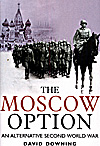 Greenhill, 2001, 16.95 pounds, ISBN 1-85367-463-X, 223 pgs., hardcover
Greenhill, 2001, 16.95 pounds, ISBN 1-85367-463-X, 223 pgs., hardcover
Originally published in 1979, this 2001 reprint "with revisions" tells the fictional tale of WWII if Hitler had been persuaded to allow Guderian and company to lead to Moscow rather than turn south into the Ukraine in 1941. And like all such alternative histories, the farther in the future you look, the more fantastic the improbabilities.
Most of this book's problem is that it is 20 years out of date. It's pretty obvious the author's revisions have not accounted for the multitude of new info coming out of the former Soviet Union. He lists only four books with a post Cold War publication date: Why the Allies Won the War (1995), Hitler (1998/2000), Stalin (1997), and Russia's War (1998). Everything else is form the 1950s, 60s and 70s.
And to a certain extent, it shouldn't matter--this is essentially fiction, not fact, with analysis of possibilities, not definites. It's just that with 10 years of new archive material coming out of the former USSR, which you can find summarized in lectures by Col. David Glantz and Charles Sharp here in MagWeb.com, it'd be nice to do more.
The whole mess starts with Hitler in a plane crash. The coma takes him out for several months, and the panzers run wild. Winter supplies are delivered promptly, and 1942 roars across more of the USSR, capturing oilfields and heading into Persia. Somewhere in there Hitler gets better and starts screwing things up, but not too badly.
On the Pacific Front, the Japanese switch codes and fake out the US, so that at Midway, four US carriers are sunk. Then they attack the USSR in 1942 and take Vladivostok, are stopped from doing anything else, and lose four carriers at the Panama Canal. Go figure.
And that's where the book ends. Rommel's outside Jerusalem, Guderian is heading to Baghdad and Tehran, and the Germans are stalled east of Moscow. The Japanese hold Midway, Vladivastok, and a little more of the South Pacific. There are some random paragraphs hinting at atomic bombs on Stuttgart in 1945, the Army-SS Civil War and other events, but that's about it. It's almost as if there was going to be a sequel.
The prose varies between inspired and insipid. Sometimes the analysis is spot-on. Other times, famous people float in to toss off a one-liner like some disjointed name-dropping game. Mostly, you just plod along trying to fish out the details from the dullness.
Don't get me wrong about alternative histories. Sharp, focused examinations of "what ifs" can be exciting, challenging, and stimulating. In many respects, that's what we wargamers try to do on the tabletop by computer game, boardgame, or miniature game. The Moscow Option may have been in that category back at its initial release because we could only guess at the information. Now that we know more about numbers and strategy, the premise should alter and so should the conclusion.
Info: Greenhill:
E-mail for more information
www.greenhillbooks.com
Back to List of Book Reviews: World War II
Back to Master List of Book Reviews
Back to Master Magazine List
© Copyright 2001 by Coalition Web, Inc.
This article appears in MagWeb (Magazine Web) on the Internet World Wide Web.
Other military history articles and gaming articles are available at http://www.magweb.com